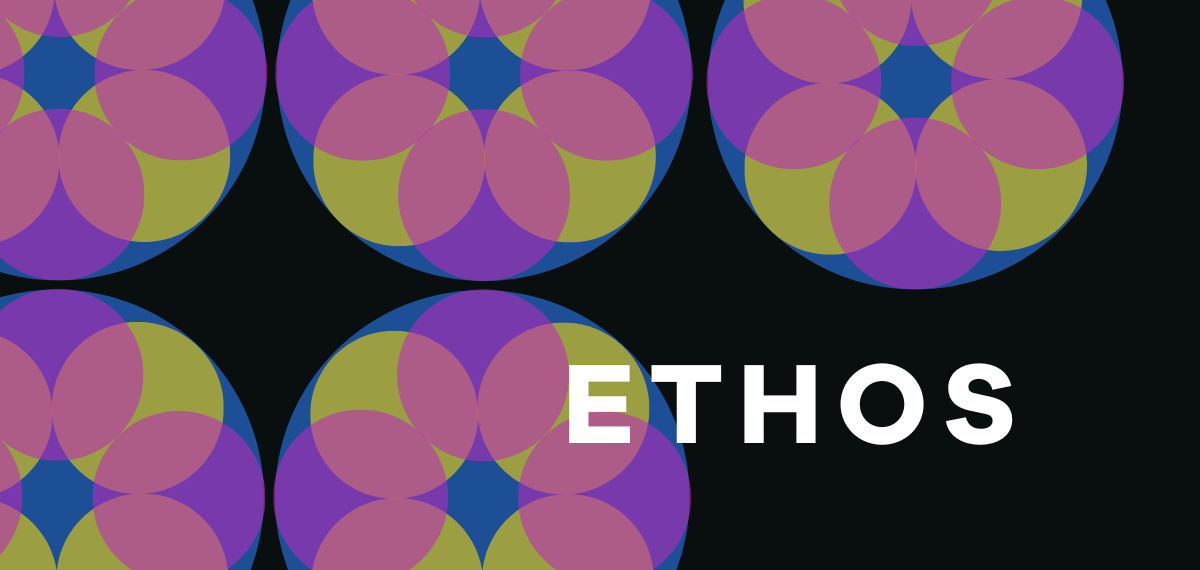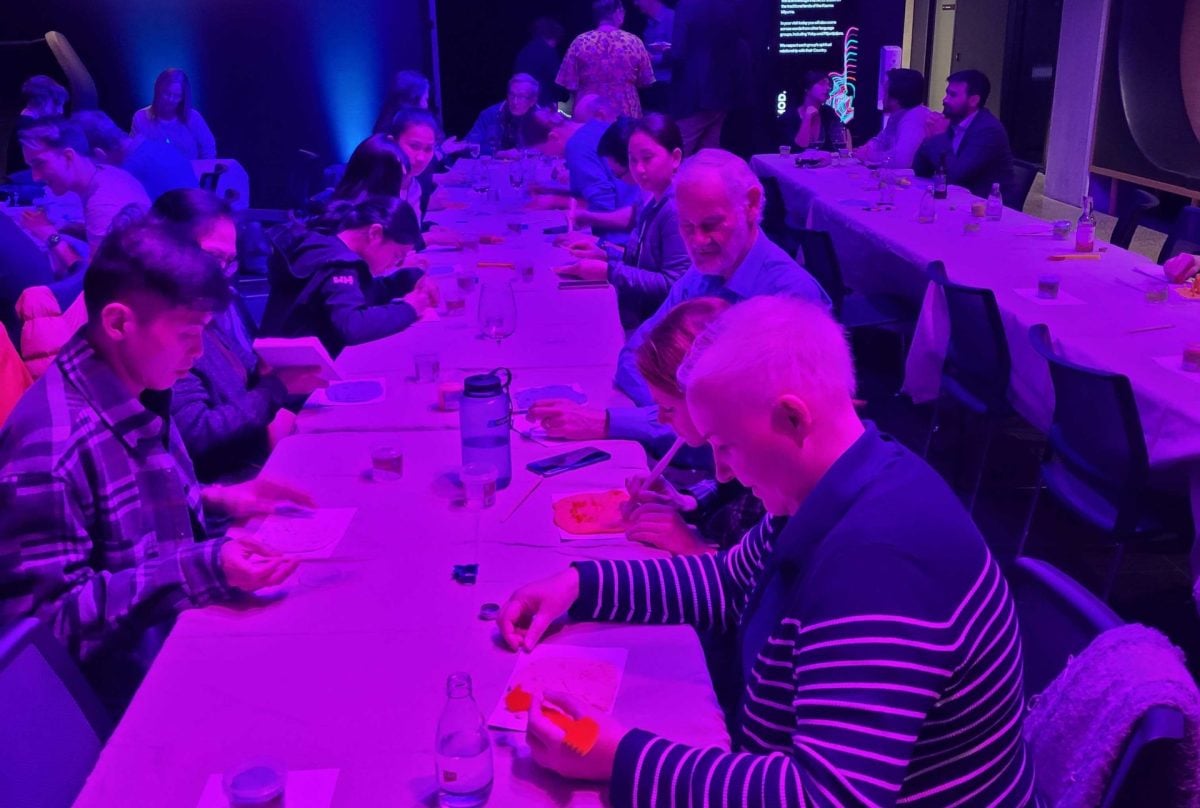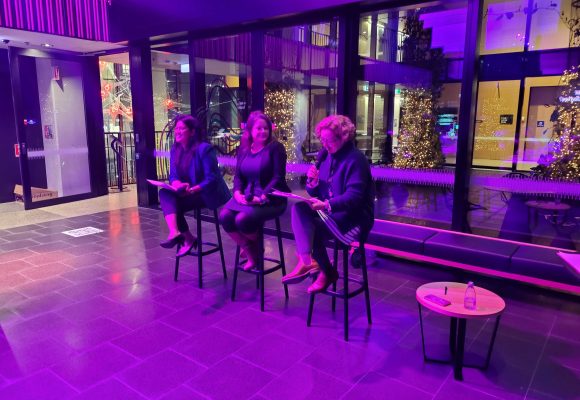Posted 27 Apr

MOD. hosted its first Ethos event for 2023 to consider the ethical implications of human interaction in space – including questions about living, working, and mining the moon, and space more broadly. Ethos aims to foster a culture of ethical questioning amongst students, researchers, and the public.
April’s gathering delved into the ethics of space inhabitation by discussing topics such as how humans might thrive in space, human relationships and psychology, and the potential benefits of cultivating the moon. The evening kicked off by inviting guests to create their own lunar landscape out of Play-Doh during an activity facilitated by Dr Dylan DeLosAngeles. The activity highlighted a huge range of lunar landscape ideas, one guest even designing a ‘Zambrero’ franchise adapted to the moon’s atmosphere! Alongside everyone’s creative interpretations of the activity, there was plenty of conversation around the already existing human impact on the moon. Guests explored this topic through discussing the ethics of lunar mining and settlement, cultural heritage on earth and other planets, and how visible alterations to the cosmos could affect Indigenous cultures.
A discussion between Associate Professor Ruchi Sinha and Associate Professor Jenny Mortimer, which was facilitated by Dr Kristin Alford, further enriched guests’ minds with the ethics of human survival and cultivation in space by providing some stimulating prompts for group conversation. Afterwards, we shared our thoughts about these ethical questions and insights into mining the moon, whilst keeping sustainability and mental health in mind.

One of the most essential things to ensure humans can thrive on the moon is managing mental health and relationships with others. Ruchi Sinha stresses the importance of this to us through discussing her research about the psychology of astronauts and submarine crew who spend periods of six months or longer in isolated environments.
So how do we protect our mental health in these conditions? One school of thought Sinha introduced the crowd to was to consider that the psychology of humans on earth is the same psychology on the moon. Meaning, the things which bring us peace and happiness on earth are just as important in space. One way astronauts have incorporated this into their intergalactic travels is through caring for plants, Sinha discusses how caring for and looking at plants has been shown to improve the experiences of astronauts travelling for long periods of time. NASA has taken this into account by sending a plant with the astronauts to help ease feelings of loneliness.
Throwing this out to the crowd, we asked what they would bring in a suitcase to space. Majority of the crowd agreed on bringing undies, a toothbrush, and digital entertainment like music or movies. Another suggestion from the crowd was condoms, highlighting our inevitable drive for human connection, even in the depths of space! This brought on discussion around the ethics of relationships in space, Sinha introduced the crowd to a notion known as the “three month rule”. After three months of being isolated with the same people there is a dip in interpersonal liking which results in conflicts and poor decision making. So it is important that astronauts are grouped according to their personality traits.
So, could we cultivate the moon? Reportedly, astronauts have grown greens like kale on the International Space Station (ISS). In fact, they were so excited about it they high-fived their kale leaves together before eating it! Evidently, fresh produce makes astronauts happy, but what else can it do?
Jenny Mortimer introduces us to her research through discussing ethics around space cultivation. Currently, astronauts living on the ISS eat microwave style packaged meals. As a result, these astronauts are not accessing all the nutrients they need, it’s important that they return to Earth just as healthy as when they left. In the light of sustainability, Mortimer introduces the crowd to research conducted by one of her PhD students who is redesigning components of plants to produce biodegradable plastic! This innovative research rethinks how plants could be used for multiple things, meaning less waste and more resources. Guests discussed how these redesigned plants could assist in engineering the supplies needed to build infrastructures.

Mortimer continued the discussion by bringing our awareness to the idea of space contamination. For example, while we can sanitise equipment brought into space, humans are “like walking carriers of bacteria, fungi, and viruses.” Therefore, our bodies host a whole bunch of other organisms that travel with us into space. Inevitably as soon as we interact with the environment of space we change it, down to a microscopic level. This has been documented through a new species of fungus growing on the ISS. If this fungus can currently survive the intense radiation and harsh conditions in space, will there be intergalactic mushrooms and other fungi in years to come? Leading on from this, we discussed how mining the moon for resources could drastically affect its geography.
This discussion resulted in a few guests suggesting that we should just “leave the moon alone” as the idea of changing such a stable object like the moon was too much! It is important to mention that the moon and other celestial bodies are a sacred part of many indigenous cultures. Therefore, mining the moon changes cultural beliefs which predate thousands of years.
Ethos is made possible with funding through the Deputy Vice Chancellor of Research and Enterprise. We hold Ethos events regularly at MOD., you can find more details here.
Renée Pastore was the rapporteur for this event and is a moderator at MOD.